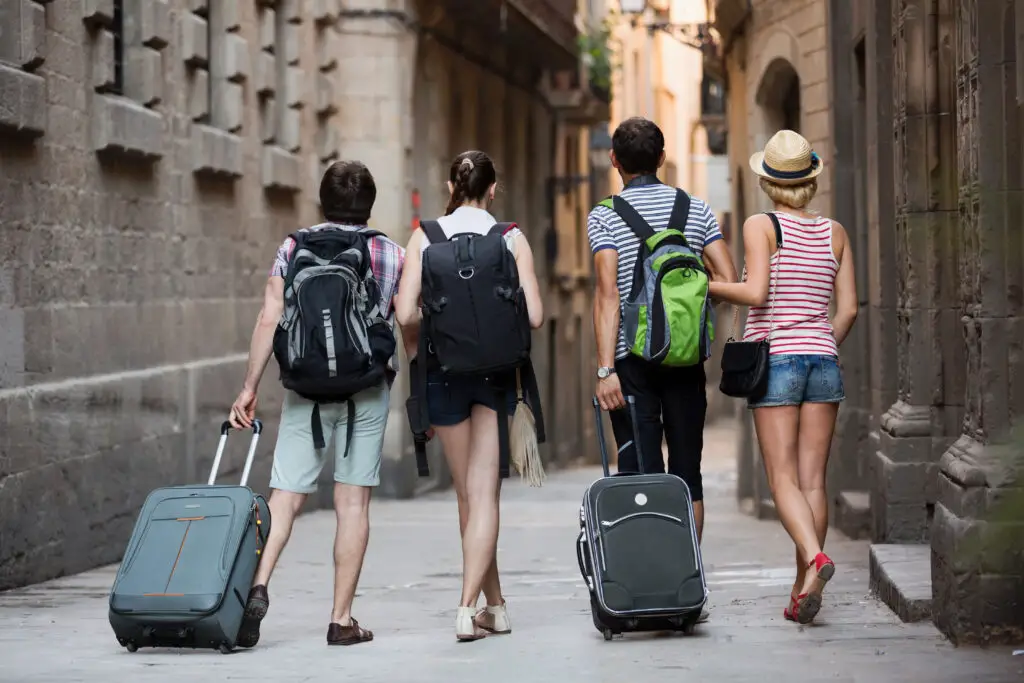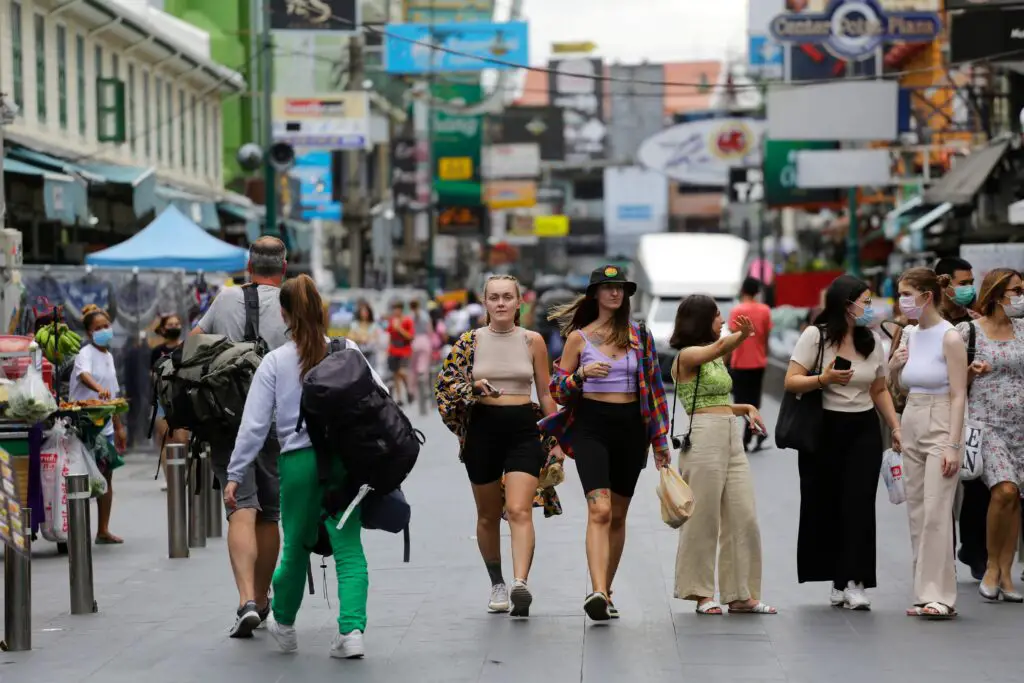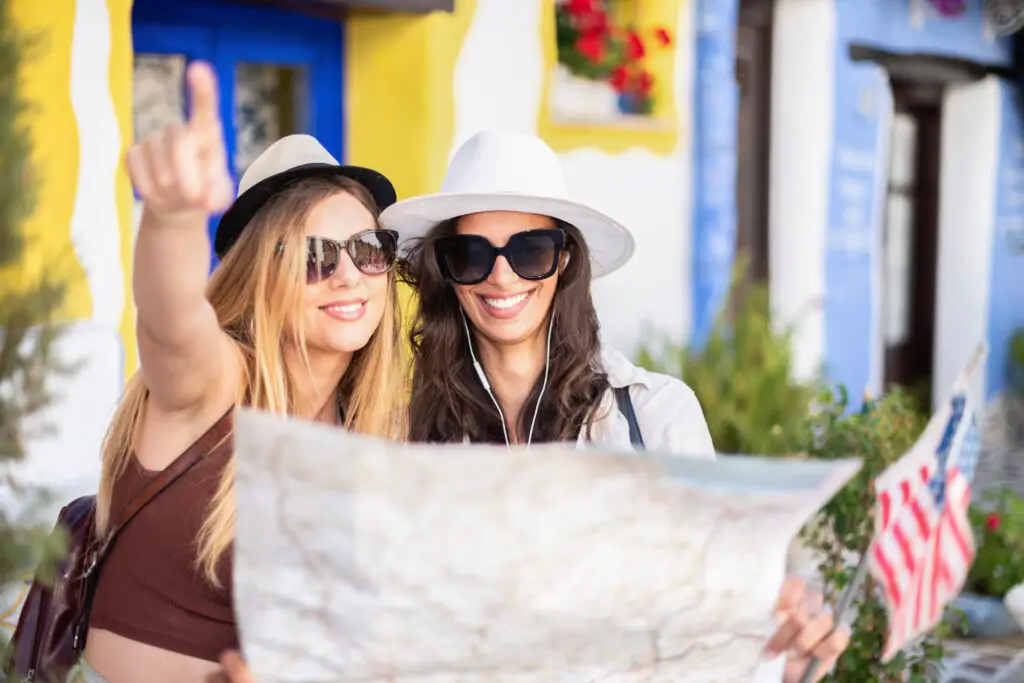1. Wearing Inappropriate Clothing at Religious Sites

It’s one thing to dress comfortably in hot weather, but strolling into a temple or cathedral with bare shoulders and short shorts is a quick way to offend. Many tourists don’t realize that modesty isn’t just a preference in these places—it’s a form of respect. You wouldn’t show up to a wedding in a bikini, so why walk into a mosque that way? Locals might not say anything, but they’ll definitely notice—and judge says BuzzFeed.
Even just carrying a scarf or lightweight cover-up can make a big difference. It’s a small gesture that shows you’re paying attention to their values. Honestly, it’s not that hard, and it can keep you from being the story a guide shares later about “that one disrespectful tourist.” Do a quick check before you head out for the day, especially if you plan to visit any sacred spaces adds the Guardian.
2. Speaking Loudly Everywhere

There’s something about being in a new country that makes some people forget the volume of their voice. Loud conversations in restaurants, public transport, or even quiet streets can feel downright obnoxious to locals. What might be normal in your hometown might come across as aggressive or disruptive elsewhere. Not every place shares the same “big personality” culture shares EuroNews.
Try lowering your voice just a notch or two. It makes you blend in better and comes across as more respectful. You’re not on stage—you’re a guest. And nobody likes a guest who shouts their way through dinner says CNN.
3. Assuming Everyone Speaks English

It’s easy to fall into the trap of starting every interaction with English, especially if it’s your first language. But assuming that every shop owner, server, or taxi driver should understand you? That can really rub people the wrong way. It feels entitled, even if you don’t mean it that way.
Learning even just a few local phrases—like “hello,” “thank you,” and “please”—goes a long way. It shows you care enough to make the effort. Locals appreciate the attempt, even if your accent is rough. It’s about humility and trying to connect, not perfection.
4. Disrespecting Local Food Customs

Trying new foods is one of the best parts of traveling, but disrespecting what’s on your plate? Big mistake. Turning up your nose at dishes, making loud comments about how “weird” something is, or even refusing to try a bite can come off as incredibly rude. Remember, what’s strange to you might be someone else’s comfort food.
If you’re not sure how to eat something, quietly watch others or ask politely. Slurping might be rude at home but expected in a ramen shop in Japan. Being open-minded doesn’t mean you have to love everything, but it does mean being respectful. And hey, you might just discover a new favorite dish.
5. Taking Photos Without Permission

Snapping a quick picture might feel harmless to you, but to locals, it can be invasive. This is especially true when photographing people, homes, or religious ceremonies. Imagine a stranger pointing a camera at your grandma while she’s at church—that’s how it feels to them.
Always ask before taking someone’s photo. A smile and a gesture toward your camera can work wonders. If they say no, respect it. Some moments are meant to be experienced, not posted.
6. Ignoring Local Etiquette

Every culture has unspoken rules, and not bothering to learn them makes you stick out in the worst way. Whether it’s tipping customs, hand gestures, or how to greet someone, small things can add up. Locals may not correct you, but they’ll notice—and it can feel like you’re just barreling through their world without caring.
Take five minutes to Google “cultural do’s and don’ts” before you go. That simple effort can save you a lot of awkward moments. People will appreciate that you’re trying to meet them on their turf. It shows you’re a thoughtful traveler, not just a tourist with a checklist.
7. Getting Drunk and Rowdy

Sure, vacation is a time to unwind—but public drunkenness? That’s not charming anywhere. Locals hate seeing their town turned into a frat party by tourists who don’t know when to stop. It’s not just annoying; it can be dangerous and disrespectful, especially in family-oriented areas.
There’s nothing wrong with enjoying a drink, but know your limits. Keep the party behavior to places where it’s actually welcomed. Acting like you’re the star of a spring break movie won’t win you any fans. And it definitely won’t earn you a warm welcome if you come back.
8. Treating the Country Like a Backdrop

It’s tempting to treat your trip like a real-life Instagram shoot, but locals aren’t just extras in your travel reel. Using poverty, ruins, or local children as props can come across as exploitative. People live here—it’s not just scenery for your next post.
Take time to actually understand the place you’re visiting. Learn the history, listen to the stories, and appreciate it beyond how it looks in a filtered photo. You’ll get so much more out of the experience—and you’ll avoid looking like someone who’s just in it for the likes.
9. Not Trying to Use Local Currency

Tourists who insist on paying in dollars or euros can really frustrate shopkeepers and waitstaff. It puts the burden on locals to convert rates or even accept currency they’re not set up to handle. It’s not just inconvenient—it feels like you’re saying, “My money is more important than your system.”
ATMs exist for a reason. Use them. And try to carry smaller bills—nobody wants to break a huge note for a bottle of water. It’s just one more way to show that you respect the way things work around here.
10. Bargaining Too Aggressively

Haggling is part of the culture in many places, but there’s a fine line between bargaining and bullying. Tourists who nitpick prices down to the last cent without realizing how little that money means to them (and how much it means to the vendor) often come across as mean-spirited. It stops being about getting a fair deal and starts feeling like disrespect.
If you’re unsure what’s appropriate, ask a local or watch how others do it. When in doubt, pay a little more than you think you should. It won’t break your budget, but it might make someone’s day. And hey, they’ll probably remember you kindly for it.
11. Acting Like You Own the Place

Some tourists walk around like they’re doing the world a favor by showing up. Demanding special treatment, ignoring local rules, or complaining that things aren’t “like home” is a quick way to wear out your welcome. If you wanted things to be like home, you probably should’ve stayed there.
Approach your trip with curiosity, not entitlement. You’re a guest—act like one. Be flexible when things go differently than expected. It’s part of the experience, and locals will respect you more if you roll with it.
12. Littering or Disrespecting Nature

Leaving trash behind after a beach day or hike doesn’t just harm the environment—it insults the people who live there. Tourists who treat nature like a theme park and leave a mess behind really tick off locals. It’s not a vacation spot to them; it’s home.
Bring a bag, pick up after yourself, and follow the rules about where you can go. Whether it’s staying on the trail or not feeding wildlife, the guidelines exist for a reason. Respecting the environment is a form of respecting the community. And no one likes someone who trashes their backyard.
13. Refusing to Follow Queue Culture

Cutting in line or ignoring how people queue is a surefire way to make enemies fast. In places like the UK or Japan, the line is sacred. Even if you’re just “squeezing in” or “didn’t see the line,” locals will absolutely notice—and they won’t forget it.
Just pay attention and wait your turn. It’s a small thing, but it shows you’re tuned into the social vibe. You don’t have to be perfect, but you do have to be polite. And really, would you want someone doing that to you?
14. Disrespecting Local Transportation Norms

Whether it’s standing on the wrong side of the escalator, talking loudly on the metro, or blocking train doors, tourists often overlook public transport etiquette. These spaces are part of locals’ daily routine, and thoughtless behavior makes their lives harder. It’s not cute—it’s inconsiderate.
Watch how others act before jumping into your own routine. If people are quiet, match the mood. If there’s a clear system for boarding or exiting, follow it. You’ll blend in more and avoid the silent glares that say, “Tourist alert.”
15. Being Totally Unprepared

Showing up with no idea about the local culture, no map, and no clue where you are might seem adventurous to you, but it can look careless or even disrespectful to locals. Asking the same basic questions over and over when the answers are on signs or brochures doesn’t win you any fans. It puts the burden on others to constantly help you.
Take a few minutes before you head out to get your bearings. Download a translation app, learn the local emergency number, and get familiar with basic geography. It shows that you value the place enough to prepare for it. And honestly, you’ll enjoy yourself more when you’re not in a constant state of confusion.
